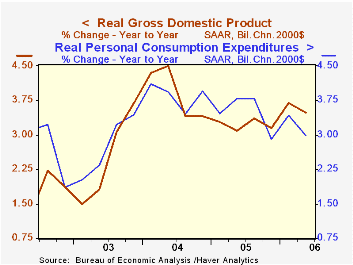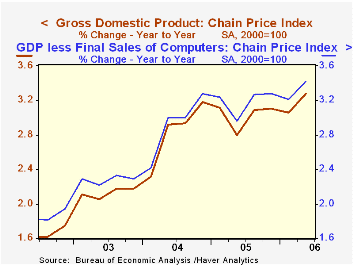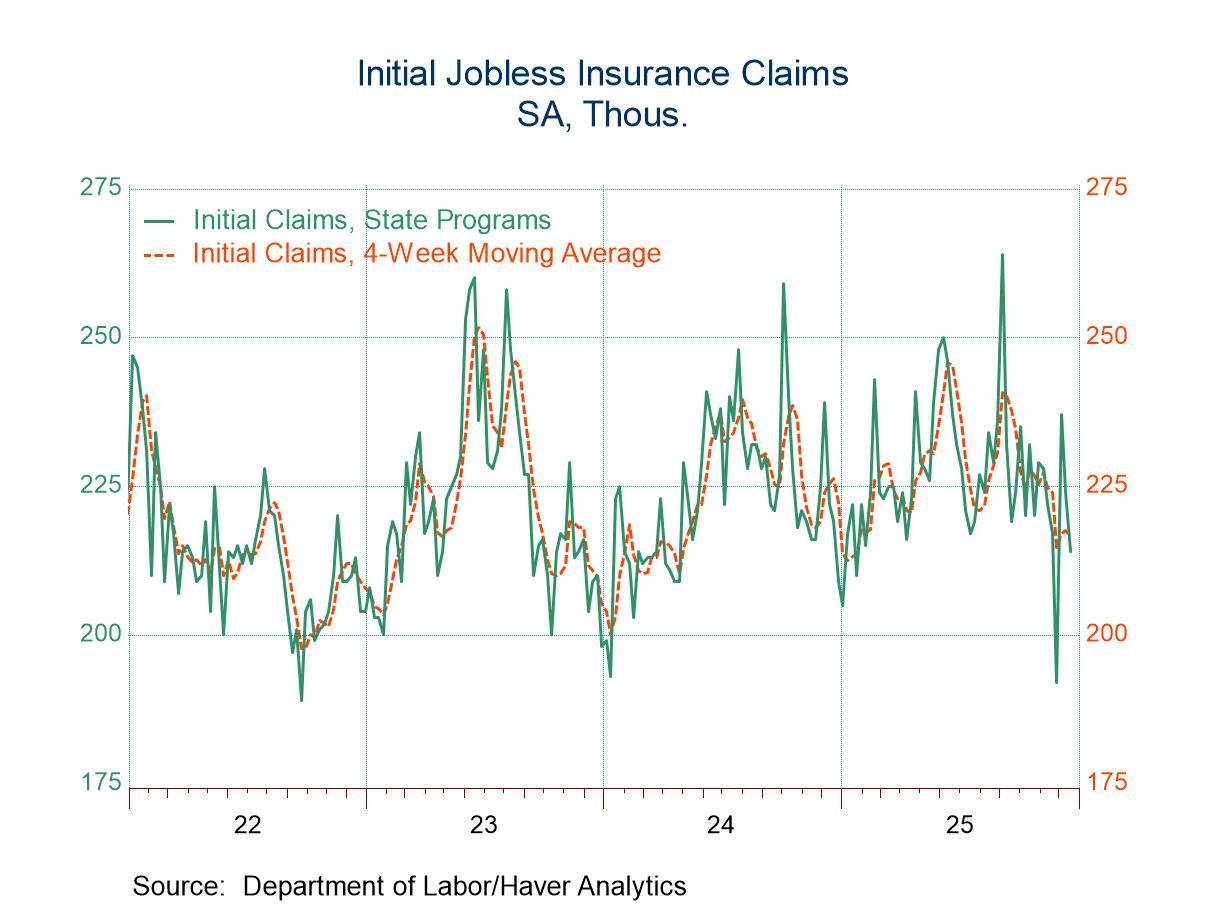 Global| Jul 28 2006
Global| Jul 28 2006US GDP Growth Slowed
by:Tom Moeller
|in:Economy in Brief
Summary
U.S. real GDP growth last quarter slowed to 2.5% (AR) from 3.7% during the prior four quarters and the figure fell short of Consensus expectations for a 3.0% advance. Much of the disappointment stemmed from a meager 2.7% advance in [...]

U.S. real GDP growth last quarter slowed to 2.5% (AR) from 3.7% during the prior four quarters and the figure fell short of Consensus expectations for a 3.0% advance.
Much of the disappointment stemmed from a meager 2.7% advance in business investment. It reflected a 1.0% (+6.9% y/y) decline in spending on equipment & software as well as a 21.6% (-1.0% y/y) drop in spending on transportation equipment.
Growth in real personal consumption expenditures also slowed to 2.5% from 3.4% during the prior four quarters. Durables spending growth fell 0.5% (3.3% y/y) due to a 3.1% (-4.6% y/y) drop in motor vehicles & parts.
Residential investment fell for the third straight quarter. The 6.3% decline (-0.2% y/y) knocked 0.4 percentage points out of 2Q growth in real GDP.
Final sales to domestic purchasers overall grew just 1.6% (3.0% y/y) following four quarters of 3.7% growth. Earlier growth rates were revised down but the effect on GDP was limited by upward revisions to inventories.Last quarter, inventories added 0.4 percentage points to GDP growth.In addition, improvement in net exports added 0.3 percentage points to growth as exports grew 3.3% (7.4% y/y) and imports inched up 0.2% (6.1% y/y).
The GDP chain price index grew 3.3%, the same as during 1Q. Less final sales of computers, the chain price index grew 3.5% (3.5% y/y).
| Chained 2000$, % AR | 2Q '06 | 1Q '06 | Y/Y | 2005 | 2004 | 2003 |
|---|---|---|---|---|---|---|
| GDP | 2.5% | 5.6% | 3.5% | 3.2% | 3.9% | 2.5% |
| Inventory Effect | 0.4% | -0.0% | 0.6% | -0.3% | 0.4% | 0.0% |
| Final Sales | 2.1% | 5.6% | 2.9% | 3.5% | 3.5% | 2.5% |
| Foreign Trade Effect | 0.3% | -0.0% | -0.1% | -0.1% | -0.5% | -0.3% |
| Domestic Final Demand | 1.6% | 5.4% | 3.0% | 3.6% | 4.0% | 2.8% |
| Chained GDP Price Index | 3.3% | 3.3% | 3.3% | 3.0% | 2.8% | 2.1% |
Tom Moeller
AuthorMore in Author Profile »Prior to joining Haver Analytics in 2000, Mr. Moeller worked as the Economist at Chancellor Capital Management from 1985 to 1999. There, he developed comprehensive economic forecasts and interpreted economic data for equity and fixed income portfolio managers. Also at Chancellor, Mr. Moeller worked as an equity analyst and was responsible for researching and rating companies in the economically sensitive automobile and housing industries for investment in Chancellor’s equity portfolio. Prior to joining Chancellor, Mr. Moeller was an Economist at Citibank from 1979 to 1984. He also analyzed pricing behavior in the metals industry for the Council on Wage and Price Stability in Washington, D.C. In 1999, Mr. Moeller received the award for most accurate forecast from the Forecasters' Club of New York. From 1990 to 1992 he was President of the New York Association for Business Economists. Mr. Moeller earned an M.B.A. in Finance from Fordham University, where he graduated in 1987. He holds a Bachelor of Arts in Economics from George Washington University.






